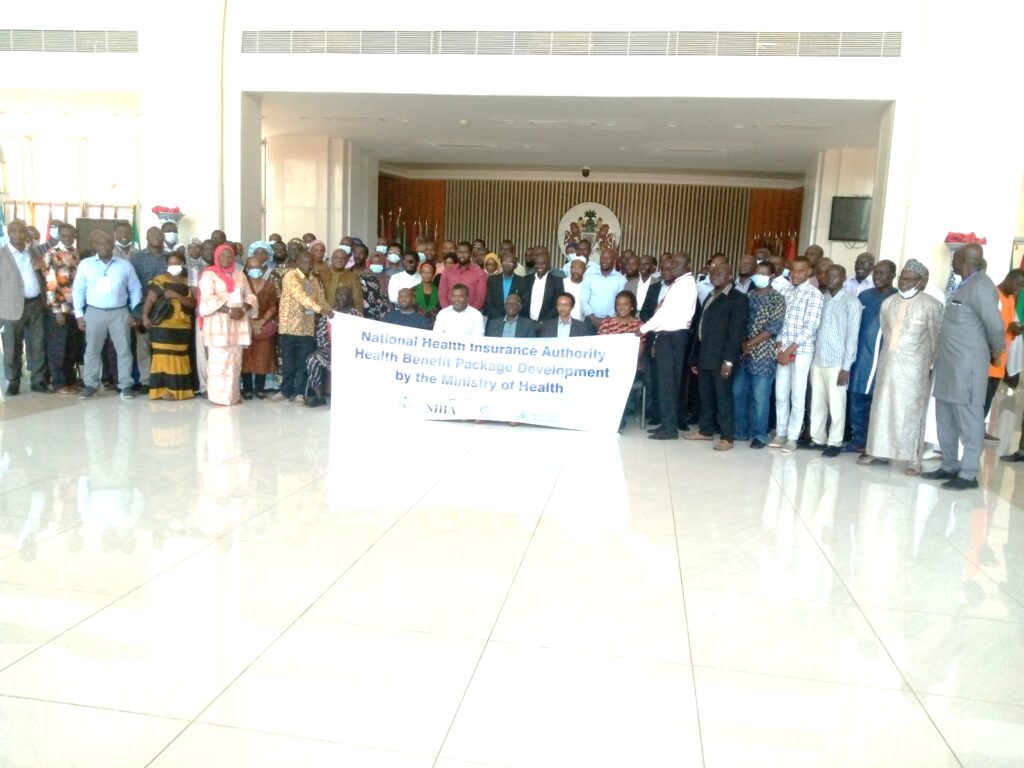By Yunus S Saliu
Developing the Health Benefits Package (HBP) of health services to be provided under The Gambia National Health Insurance Service (NHIS), the Ministry of Health, on Tuesday, embarked on three-day stakeholders and experts consultative workshop for intervention selection.
The workshop is currently underway at the Sir Dawda Kairaba International Conference Center, Bijilo.
As indicated, the NHIS HBP will be a prioritized set of interventions drawn from the national Essential Health Care Package (EHCP). Meanwhile, in the ongoing workshop, the Ministry of Health invited disease area experts and stakeholders to develop and validate the list of essential health interventions that should be provided in The Gambia. This is to get answers for the list of interventions currently provided in The Gambia, the coverage and quality of interventions provided, and any interventions or services that are not currently in the EHCP but should be considered for inclusion.
Speaking at the opening of the workshop, the Honourable Minister of Health Dr Momadou Samateh, said the Ministry is delighted to talk about the national health insurance saying gradually the vision of His Excellency President Adama Barrow has been fulfilled in this country.
He lamented of inherited a very challenging health sector, dilapidated infrastructures, obsolete or absent equipment, low health capacity, and among others, “but we are happy to say His Excellency government has started doing something about it.”
He dilated on their notable achievements which included expansion of the health facilities across the length and breadth of the country, new health facilities are been constructed, and old ones are been upgraded, modernized, expanded, and brought up to good standards.
He talked about the procurement of equipment that is needed to make sure that the people of this country get the entire package of treatment in this country.
“Of course, all these will not succeed if we do not have people who are supposed to provide the services. Capacity building has started at all levels, we started a residence training program in the Gambia for the first time in the history of this country while nurses are trained to specialize and among others,” he outlined some of the achievements further since coming to power of the sitting government. This he described as “a big plus to our country.”
He thanked their partners and people who had put in immense efforts to ensure the development of the bill and the act of the NIHS.
The chairman of the board of the National Insurance Health Scheme, Dr Malville George Robert expressed delight in the discussions and presentations by the participants and therefore thanked the technical working group and other committees of the health scheme for the work they are doing.
He emphasized that the authority has been established and they are working hard to make the program successful while he disclosed their commitment towards delivering the important initiative and ensuring that universal health care coverage is available to everyone in the country irrespective of anyone’s background, origin, and place of stay.
He noted that it is a complex process that calls for the correlation of lots of stakeholders “but it is going to be a game changer in this country in terms of health service delivery.
However, the board chairman as well dilated on three important areas as far as the NIHS is concerned this includes the health care package, actuary studies, and the sources of revenue to fund the services.
Dr Desta Tiruneh, WR of WHO in his remarks focused on what they are expected to achieve from the workshop while he as well explained the meaning, importance, the reality of NIHS,
He said the NIHS has committed to starting small and expanding gradually as the capacity gets better while he emphasized that whatever proposing in the essential package should be effective and sustainable.
Dr Tiruneh advised that no one should be left behind while the review should be democratic in the process by including all stakeholders and those disadvantaged population by bringing them on board to have a says.

